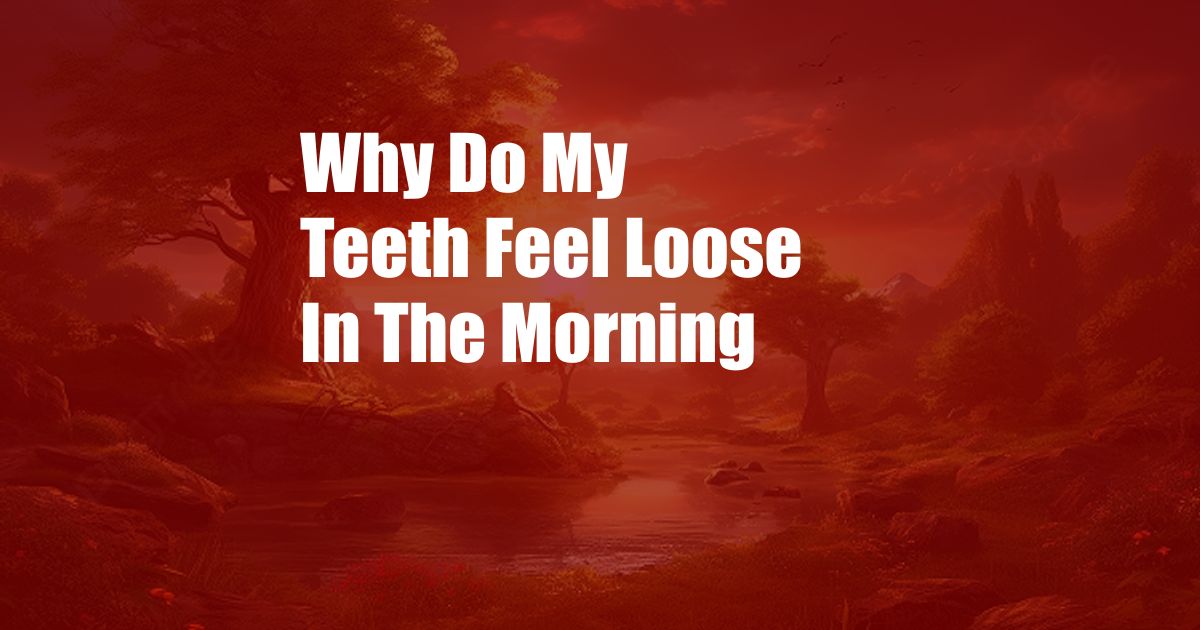
Why Do My Teeth Feel Loose in the Morning? Exploring the Causes and Remedies
As dawn breaks, I often greet the morning with an unsettling sensation: my teeth feel loose in my mouth. While it’s not a new experience, it’s one that leaves me pondering the cause behind this strange phenomenon. To unravel this mystery, let’s delve into the mechanisms that govern dental health, exploring the reasons behind loose teeth and the potential remedies at our disposal.
Gum Disease: The Silent Culprit
Gum disease, an insidious ailment that often lurks unnoticed, emerges as a foremost culprit behind loose teeth. Plaque, a sticky biofilm of bacteria that forms on teeth, harbors microorganisms that produce toxins capable of damaging gum tissue. This initiates an inflammatory process that can erode the supporting bone around teeth, weakening their attachment and leading to the sensation of looseness.
Bruxism: The Unconscious Teeth Grinder
Bruxism, the involuntary clenching or grinding of teeth, exerts excessive force on the dentition. Over time, this constant pressure can damage the periodontal ligament, the structure that connects teeth to bone. Consequently, the ligaments weaken, potentially leading to loose teeth. Nighttime grinding, when teeth are subjected to prolonged pressure without the protective cushioning of the tongue and cheeks, is a particularly common culprit.
Periodontal Disease: A More Severe Form of Gum Disease
When gum disease advances unchecked, it escalates into periodontal disease, a severe condition that affects not only the gums but also the underlying bone. As the inflammation and tissue destruction intensify, the bone surrounding teeth diminishes, compromising their stability and leading to increased mobility.
Pregnancy: Hormonal Shifts and Their Impact
Pregnancy, a time of significant hormonal fluctuations, can also contribute to loose teeth. The increased levels of progesterone and estrogen during pregnancy relax the periodontal ligaments, which can result in a temporary loosening of teeth. However, this condition typically resolves after childbirth, and teeth regain their stability.
Nutritional Deficiencies: The Essential Role of Vitamins and Minerals
Deficiencies in certain nutrients, such as vitamin C, vitamin D, and calcium, can also impair dental health and contribute to loose teeth. Vitamin C is crucial for collagen production, a protein that forms the structural framework of the periodontal ligament. Vitamin D aids in calcium absorption, essential for bone strength, while calcium itself provides the building blocks for healthy teeth and bones.
Tips and Expert Advice for Healthy, Firmly Rooted Teeth
Maintaining optimal dental health is the key to preventing loose teeth and preserving a beautiful smile. Here are some expert tips to help you achieve this goal:
- Practice meticulous oral hygiene: Brush your teeth twice a day for two minutes each time, floss daily, and use an antimicrobial mouthwash to combat plaque and bacteria.
- Visit your dentist regularly: Regular dental checkups allow your dentist to identify and address any potential issues early on, preventing minor problems from escalating into more severe ones.
- Quit smoking: Smoking damages gum tissue, increasing the risk of gum disease and tooth loss.
- Wear a nightguard: If you suffer from bruxism, a custom-fitted nightguard can protect your teeth from the damaging effects of grinding.
- Maintain a healthy diet: Ensure your diet is rich in essential nutrients, including vitamin C, vitamin D, and calcium.
FAQ on Loose Teeth: Your Questions Answered
Q: Can loose teeth be tightened?
A: In some cases, loose teeth can be tightened by addressing the underlying cause. If the looseness is due to gum disease, periodontal treatment can restore gum health and stabilize the teeth. If bruxism is the culprit, a nightguard can prevent further damage and allow the periodontal ligament to heal.
Q: What happens if a loose tooth falls out?
A: If a loose tooth falls out due to severe gum disease or trauma, it’s crucial to see a dentist promptly. Replantation, the process of reinserting the tooth into its socket, may be possible if the tooth is healthy and the supporting bone is intact. However, if the damage is extensive, the tooth may need to be extracted.
Q: Can loose teeth cause other health problems?
A: Loose teeth can contribute to other health issues, such as difficulty eating, speech impairments, and increased risk of infection. Loose teeth can also be a sign of underlying health conditions, such as diabetes or osteoporosis.
In conclusion, understanding the causes of loose teeth and implementing proactive measures to maintain dental health are essential for preserving a healthy, beautiful smile. By following the tips provided in this article, you can strengthen your teeth, prevent looseness, and enjoy a lifetime of optimal oral health.